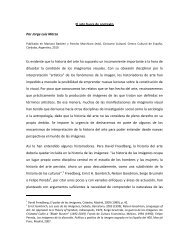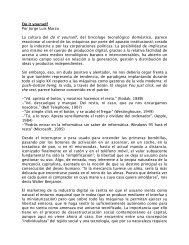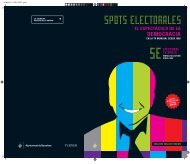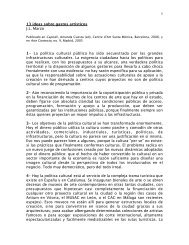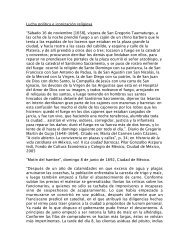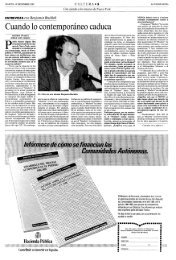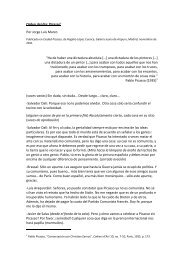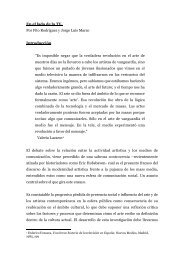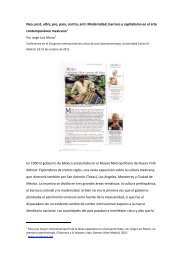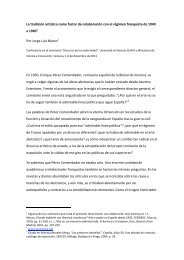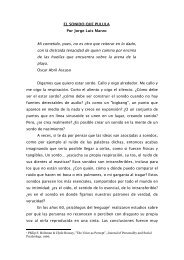Campaign Diary Roberto AlfaCampaign Diary Roberto Alfa48 499 days to goThis morning we started a shoot. I likepublicists, camera operators, art directors:they know what this is all about. And I knowwhen we meet in the bathroom. Few words andmeasured and mechanical lines. Professionalpeople who don’t get carried away by whimsor doubts. The boss turned up on set righton time. While he was having his make-updone, we went over the text and the tone. It’snot easy trying to convince such a self-centredperson. He’s repeatedly queried some of theexpressions used and says they aren’t verycolloquial. He’s happy close up, when he’spinching and patting people’s cheeks in agesture which revolts me but which he thinksis winning. You’ve got to give it to him.Ren<strong>de</strong>r unto Caesar what is Caesar’s. Yeah,his smile will be a disaster, but that cheekyself-confi<strong>de</strong>nce he’s got is good for us. When hesays what he really thinks, which doesn’t happenvery often, he’s crystal clear. I’ve seen himconvince his advisors of things which noneof them would have given a red cent for halfan hour before. It reminds me of a <strong>de</strong>sperategeneral who went to tell Hitler that there wasno petrol left and carrying on the battle wasnext to impossible. After half an hour with thedictator he came out of the office really excitedand shouted out “We’re going to win the war,we don’t need petrol!” Those moments areelectrifying, but they’ll never be seen. You can’tshow those attitu<strong>de</strong>s. Miguel couldn’t hopefor a better weapon. After a couple of hoursof hard bargaining we managed to get himto stick to the script, but we couldn’t stop himpointing his finger at the camera or gettingoff his stool. Finally we’ve had to drop thesteadicams, making it look a bit fictionalwhich I personally find annoying.Sud<strong>de</strong>n split with political audiovisual workAs the <strong>de</strong>fi nition of militant cinema is complex, it shouldnot be equated with documentary or non-fi ction cinema,or solely and exclusively with what is produced outsi<strong>de</strong>habitual commercial structures. It is a non-alienatingcinema, which does not wish to restrict itself to tellingfables <strong>de</strong>tached from human reality but rather toinquire into the conditions of that reality and, as far asit can, to help change them. These political or agitpropcinema movements, one of whose major historical referencepoints is the epic political and dialectical cinemama<strong>de</strong> by the great Russian filmmakers in the silentmovie era, will grow in a series of ten<strong>de</strong>ncies whosegoal is the transmission of i<strong>de</strong>ology and will becomeimportant in various historical and social contexts.With the passage of time we fi nd, running in lockstepwith the technical evolution of the image, the <strong>de</strong>velopmentof communication strategies in both the cinemaand on television driven by new technology. But allof this genealogy, historically rich both in theoreticaloutput and in fi lms, would in some way be restrictedfrom the point of view of contemporary “vi<strong>de</strong>o politics”since the effi cacy of marketing and advertisinghas progressively drained away all i<strong>de</strong>ological argument.It could be said that what would have been thenatural <strong>de</strong>velopment of a militant conception of theaudiovisual media has been abruptly cut off in thebranch of election ads in favour of the trivialisation ofthe message, also extendable to the “commercialisation”of political campaigns. The fi nal over<strong>la</strong>p betweenadvertising and propaganda (even though this divisionhas been a source of much comment since aca<strong>de</strong>micsbecame interested in it) imposes itself from the conceptionto the formalisation of the electoral product andthus triggers a powerful mechanism for change in thepolitical arena.No<strong>net</strong>heless, this approach might lead one to think thatc<strong>la</strong>ssical cinematographic practice would be differentfrom mo<strong>de</strong>rn-day political vi<strong>de</strong>os in that it would notbe trivial, something which would certainly be questionablein the light of the many products <strong>de</strong>rived fromfascist and communist i<strong>de</strong>ology.Walter Benjamin wrote about the sterilisation of politicsas a fascist strategy, and from a contemporary perspectivethis needs to be looked at again with renewedinterest. In all recent election campaigns we have seenhow the propaganda of very different political movementsincreasingly yields to specific aesthetic criteria,with a profusion of p<strong>la</strong>stic resources from very variedreference points and applied to the various politica<strong>la</strong>nd partisan discourses. If Benjamin was right andthese fascist strategies contributed to the conversionof humanity into a spectacle in itself, we might start topoint out where we are on the road, at the risk of being<strong>de</strong>vastated by the evi<strong>de</strong>nce of an abandonment ofprinciples. If the <strong>de</strong>valuation of the <strong>de</strong>mocratic systemhas become the aestheticisation of politics, it is no surprisethat Alfa should have <strong>de</strong>tected the growing trendtowards the <strong>de</strong>mocratisation of fascism.
Campaign Diary Roberto AlfaCampaign Diary Roberto Alfa50 518 days to goInter<strong>net</strong>, ads and politics6 days to goOn campaign <strong>la</strong>nguage as a <strong>de</strong>ep b<strong>la</strong>ck holeIt’s full steam ahead. With the audio materialwe’ve edited today, the TV ads are now ready.With eight days to go I see them as Vaselineand pus torpedoes anxious to leave theirtubes and not able to wait one second longer.The inter<strong>net</strong> ads have been running for twomonths and doing well. The Net’s great: if youdon’t sign them or they are in the name of theparty’s youth wing, you can post vi<strong>de</strong>os andget around electoral <strong>la</strong>w. In fact according toone of my colleagues, inter<strong>net</strong> is going to makeus even richer as campaigns on the Net arenow permanent and <strong>la</strong>st all year round, justlike the ones for Christmas.Posters, banners, press inserts, radio ads,journalists’ blogs, websites, celebrity backers,teams for shooting, editing, production, theextras, the studio; everything is at its peak.And that’s not to mention the lighters, biros,caps, electoral programmes, T-shirts, motorcyclists,coaches and mass catering, as that’snot what I’m into. <strong>El</strong>ectoral campaigns arestill like wars used to be: there are no precisionbombardments but just mass assaults, especiallyat the start. The party has been workinghard on the press and congress for months.Now it’s a question of putting a face to allthat. And with all the risk that that bringswith it, of course.Perhaps we should distinguish the irruption of theinter<strong>net</strong> into political discourse from the irruption ofpolitical discourse into the inter<strong>net</strong>. But what concernsus here is singling out the emergence of the inter<strong>net</strong>as a means of getting election i<strong>de</strong>as across. On theone hand there is a whole new horizon of re<strong>la</strong>tions inwhich the rhizome effect of the medium has led to the“horizontal” production of critical thinking, while on theother, and from a leftist standpoint which calls itself“new”, the <strong>de</strong>cision has been ma<strong>de</strong> to distribute a fossilizedmessage which has slowly come loose from thenew communication circumstances.The emancipatory use of open technologies, the settingup of cooperative p<strong>la</strong>tforms and a conception of politicsthat is increasingly distant from the spectacle of<strong>de</strong>mocracy have led to the <strong>de</strong>velopment of new notionsof “public communication space” which are opposed tothe c<strong>la</strong>ssical i<strong>de</strong>a of an “organ of expression”.Furthermore, Alfa’s reference to the importance of theface in the electoral message could come straight fromhis notes for his university c<strong>la</strong>sses: “Do not copy famousphotos. Some campaign photos come from unrepeatablehistorical situations. The photo of FrançoisMitterrand looking at the horizon with the slogan ‘LaFrance unie’ worked for Mr. Mitterrand. If you’ve beenpresi<strong>de</strong>nt of France for seven years, want to make it fourteenyears in office and are the symbolic (if not political)heir of De Gaulle and the Kings of France, then that typeof photo will be good for you; if you aren’t, it won’t.”I listen to the politicians and I think: how I’dlike the essence of politics to be transmitted in<strong>la</strong>nguage and not through <strong>la</strong>nguage! Theyspeak a <strong>la</strong>nguage that takes in everything.The real damage done by politics, like advertising,is giving everything a name. That,in addition to killing the politician whicheveryone has insi<strong>de</strong> them, con<strong>de</strong>mns politics tothe perversion of <strong>la</strong>nguage, the disappearanceof silence, of the distance between two consecutivefootprints in the sand. With no gap inbetween, two successive prints are nothing.The word is only <strong>de</strong>signed for the present andhence for forgetting. Bah! Plus a victory wipeseverything out and renames everything.In any campaign there are <strong>la</strong>nguage games. From theslogan as the great catalyst of the attitu<strong>de</strong> of the candidate/partyto the “core i<strong>de</strong>as” of a campaign which areshed like a bunch of grapes in drip-fed sentences, thereis a complete consi<strong>de</strong>red literary recreation composedwith extreme care and correctness which has finallybecome called “politics”.Political correctness or the politically correct is usedas a valued varnish in electoral campaigns; it is oneof the great contributions of political marketing to theprogressive stupidity of our socio-political re<strong>la</strong>tions.Normally a <strong>la</strong>nguage is required which <strong>de</strong>scribes i<strong>de</strong>as,politics and behaviour in an attempt to minimise thepotential offence caused to ethnic, cultural and religiousgroups. A <strong>la</strong>nguage which on occasion is taskedwith camoufl aging obfuscations and attitu<strong>de</strong>s or withsweetening discourses which at some point “wentastray”. Both the expression “politically correct” and itsuse have always been controversial, but it is precisely inthis controversy where attention is distracted and a newspace for confrontation is created, one that <strong>de</strong>als in lies,reproach and fury.The election ad as we have known it over recent years,save for f<strong>la</strong>grant exceptions which have ma<strong>de</strong> harshnessor discord into their hallmark, has for some timenow avoi<strong>de</strong>d any questioning of its political correctness,as it subverts the real meaning of words and con<strong>de</strong>mnspolitics to the perversion of <strong>la</strong>nguage as Alfa suggests.The “universal” approach divests <strong>la</strong>nguage of real meaning;it is better to avoid any negative reaction and ensurethat you gain audience at all costs by means of the stylisticaudiovisual genre. Audiovisual media as the negationof <strong>la</strong>nguage. The echo coming from the b<strong>la</strong>ck hole intowhich the reasons fell will be the script.




